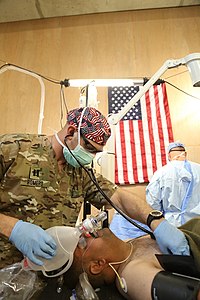
Photo from wikipedia
AIM To elicit oncology nurse leaders' perceptions and experiences of accessing, using, and interpreting report data at the unit level, and their suggestions for future reports. BACKGROUND Nurse leaders are… Click to show full abstract
AIM To elicit oncology nurse leaders' perceptions and experiences of accessing, using, and interpreting report data at the unit level, and their suggestions for future reports. BACKGROUND Nurse leaders are expected to use data reports for decisions about unit-level operations, yet data may be inaccessible, unavailable, and lack relevance for improving patient care and unit-level outcomes. METHODS A purposeful sampling was used to recruit 12 unit-level nurse leaders. Qualitative data were collected through semi-structured interviews and analyzed using thematic content analysis. RESULTS Consistent themes included the lack of accurate, useful, and meaningful data specifically related to patient care. Accessibility Challenges, Limits to Applicability, and Suggestions for Improvement were the main themes. CONCLUSION Nurse leaders require real-time data to effectively implement clinical interventions and practice changes for improving unit-level patient care. IMPLICATIONS FOR NURSING MANAGEMENT Nurse leaders emphasized that their insight into the development of customizable reports is crucial for obtaining meaningful data relevant to the varied unit-level healthcare setting. Reports targeting unit-level outcomes would provide meaningful data to facilitate clinical improvement where patient care is provided. Improved reports increase the likelihood of their use and the potential for enhancing the quality and safe care outcomes.
Journal Title: Journal of nursing management
Year Published: 2022
Link to full text (if available)
Share on Social Media: Sign Up to like & get
recommendations!